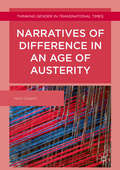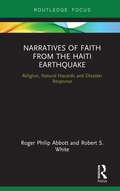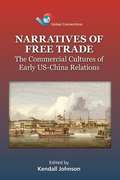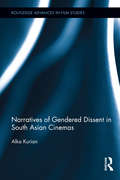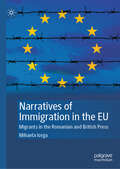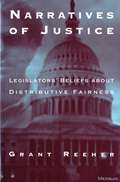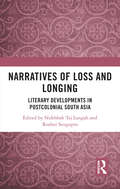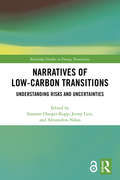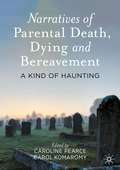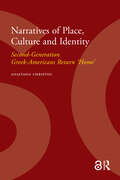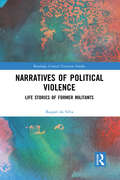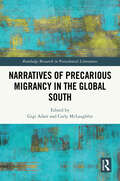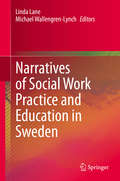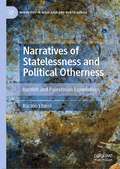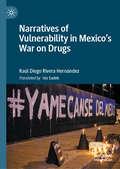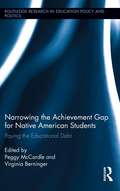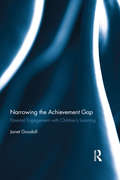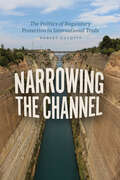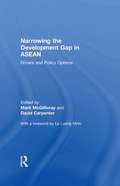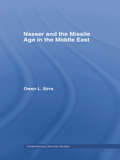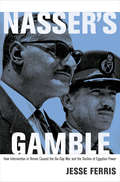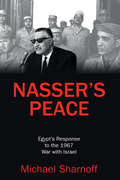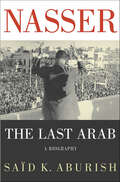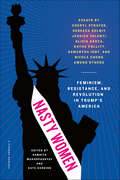- Table View
- List View
Narratives of Difference in an Age of Austerity
by Irene GedalofThis book traces the narrative strategies framing austerity policies through an illuminating analysis of policy documents and political discourses, exposing the political consequences for women, racialized minorities and disabled people. While many have critiqued the ways in which austerity has captured the contemporary political narrative, this is the first book to systematically examine how these narratives work to shift the terms within which policy debates about inequality and difference play out. Gedalof's exceptional readings of these texts pay close attention to the formal qualities of these narratives: the chronologies they impose, their articulation of crisis and resolution, the points of view they construct and the affective registers they deploy. In this manner she argues persuasively that the differences of gender, race, ethnicity and disability have been stitched into the fabric of austerity as excesses that must be disavowed, as reproductive burdens that are too great for the austere state to bear. This innovative, intersectional analysis will appeal to students and scholars of social policy, gender studies, politics and public policy.
Narratives of Faith from the Haiti Earthquake: Religion, Natural Hazards and Disaster Response (Routledge Focus on Religion)
by Roger Philip Abbott Robert S. WhiteThis book presents an in-depth ethnographic case study carried out in the years following the 2010 Haiti earthquake to present the role of faith beliefs in disaster response. The earthquake is one of the most destructive on record, and the aftermath, including a cholera epidemic and ongoing humanitarian aid, has continued for years following the catastrophe. Based on dozens of interviews, this book gives primacy to survivors’ narratives. It begins by laying out the Haitian context, before presenting an account of the earthquake from survivors’ perspectives. It then explores in detail how the earthquake affected the religious, mainly Christian, faith of survivors and how religious faith influenced how they responded to, and are recovering from, the experience. The account is also informed by geoscience and the accompanying "complicating factors." Finally, the Haitian experience highlights the significant role that religious faith can play alongside other learned coping strategies in disaster response and recovery globally. This book contributes an important case study to an emerging literature in which the influence of both religion and narrative is being recognised. It will be of interest to scholars of any discipline concerned with disaster response, including practical theology, anthropology, psychology, geography, Caribbean studies and earth science. It will also provide a resource for non-governmental organisations.
Narratives of Free Trade
by Kendall JohnsonThe twelve essays in this collection focus on the first commercial encounters between an ancient China on the verge of systemic social transformations, and a fledgling United States, struggling to assert itself globally as a distinct nation after the Revolutionary War with Great Britain. In early accounts of these encounters, commercial activity enabled cross-cultural curiosity, communication and even mutual respect but also occasioned confrontation as ambitious traders in early American companies pursued lucrative opportunities, often embracing a British mode of imperialism in the name of "free trade. " The book begins in the 1780s with the arrival in Canton of the very first American ship The Empress of China and moves through the nineteenth century, with Caleb Cushing negotiating the Treaty of Wangxia (1844) in Macau after the First Opium War and, at the century's close, Secretary of State John Hay forging the Open Door Policy (1899). Because it is not possible to consider Sino-American relations in a vacuum, the essays remain attuned to the contemporaneous involvement of competing European trading partners, especially the British, in Canton, Macao, and the general region of Pearl River Delta. All of the essays address the history of American-Chinese commerce to recover a prescient dialogue or scene of exchange that resonates in the current tensions and promises of world financial reform. The interdisciplinary essays anchor big ideas in the careful analysis of specific literary, diplomatic, and epistolary writings, and the collection as a whole develops a rich visual dimension to the historical record. The result is an engaging and qualitatively collaborative book that brings to life a fascinating story of antagonism and collaboration between two countries that followed very different paths on route to becoming economic superpowers of the early twenty first century.
Narratives of Gendered Dissent in South Asian Cinemas (Routledge Advances in Film Studies)
by Alka KurianThis book conducts a post-colonial, gendered investigation of women-centred South Asian films. In these films, the narrative becomes an act of political engagement and a site of feminist struggle: a map that weaves together multiple strands of subjectivity—gender, caste, race, class, religion, and colonialism. The book explores the cinematic construction of an oppositional narrative of feminist dissent with a view to elaborate a historical understanding and theorisation of the ‘materiality and politics’ of the everyday struggle of Indian women. The book analyzes the ways that ‘cultural workers’ have tended to use subversive narratives as a tool of resistance. Narratives that are political, ideological, classed, raced and gendered offer the focus of this exploration. Through strategies of disclosure and documentation of memory, personal experiences, and imaginary events shaped by the larger historical, political, and cultural contexts, these discursive texts engage in the processes of struggle against a plethora of oppression: caste, class, religion, patriarchal, sexual, and (neo)colonial. The study looks at the manner in which, through their creative and aesthetic interventions, South Asian film makers enable the articulation of an alternative gendered subjectivity as well as constitute the ground for personal and collective empowerment. Films discussed include Shyam Benegal’s Nishaant, Nandita Das’ Firaaq, Beate Arnestad’s My Daughter the Terrorist, and Sarah Gavron’s Brick Lane.
Narratives of Immigration in the EU: Migrants in the Romanian and British Press
by Mihaela IorgaThis book examines the representation of migrants and the European Union (EU) in the Romanian and British press, adopting a Critical Discourse Analysis approach to analyse a corpus of newspaper articles published between 1st January 2006 and 31st December 2018. The analysis reveals that through conceptual metaphors, migrants were likened to objects, ships, illegal goods, waves, flows, liquids, invaders, enemies and threats. The key themes identified in the analysis are the quantification and the &‘otherisation&’ of migrants, as well as their portrayal as economic burdens or invaders in their destination countries. With regard to the EU, the author explores how both countries&’ memberships have followed different trajectories than those of other member states, ever since their accession to the EU bloc. The novelty of this research lies in the diachronic comparison of the representations of migrants and the European Union in Romania, a country characterised by emigration, versus the United Kingdom, a country characterised by immigration. This volume will be of interest to academics and students concerned with issues to do with migration and the EU, including those in fields such as political communication, migration policy, sociology of migration, and the language of media.
Narratives of Loss and Longing: Literary Developments in Postcolonial South Asia
by Edited by Nukhbah Taj Langah and Roshni SenguptaThis volume brings together new research on the developing and transforming literary scape in South Asia in the aftermath of the partitions of 1947 and 1971. It thematically explores the transformations that have taken place in the literary spheres of India, Pakistan and Bangladesh, since violence and irresolvable conflicts wreaked the subcontinent, through the narratives of loss and longing.The volume deals with key themes such as feminism, minorities and marginality, vernacular history, Bengali literary representations, and post-Partition artistic and literary representations. It contributes towards fostering a network for academic exchange across the borders thereby presenting diverse and in-depth studies on a plethora of subjects within the larger framework of literary landscapes.Narratives of Loss and Longing will be of interest to scholars of literary studies, postcolonial and decolonial studies, partition studies, minority studies, refugee studies, gender and women's studies and those interested in South Asia, especially India, Pakistan and Bangladesh.
Narratives of Low-Carbon Transitions: Understanding Risks and Uncertainties (Routledge Studies in Energy Transitions)
by Jenny Lieu Susanne Hanger-Kopp Alexandros Nikas"The Open Access version of this book, available at https://doi.org/10.4324/9780429458781, has been made available under a Creative Commons Attribution-Non Commercial-No Derivatives 4.0 license." This book examines the uncertainties underlying various strategies for a low-carbon future. Most prominently, such strategies relate to transitions in the energy sector, on both the supply and the demand side. At the same time they interact with other sectors, such as industrial production, transport, and building, and ultimately require new behaviour patterns at household and individual levels. Currently, much research is available on the effectiveness of these strategies but, in order to successfully implement comprehensive transition pathways, it is crucial not only to understand the benefits but also the risks. Filling this gap, this volume provides an interdisciplinary, conceptual framework to assess risks and uncertainties associated with low-carbon policies and applies this consistently across 11 country cases from around the world, illustrating alternative transition pathways in various contexts. The cases are presented as narratives, drawing on stakeholder-driven research efforts. They showcase diverse empirical evidence reflecting the complex challenges to and potential negative consequences of such pathways. Together, they enable the reader to draw valuable lessons on the risks and uncertainties associated with choosing the envisaged transition pathways, as well as ways to manage the implementation of these pathways and ultimately enable sustainable and lasting social and environmental effects. This book will be of great interest to students, scholars, and practitioners of environmental and energy policy, low-carbon transitions, renewable energy technologies, climate change action, and sustainability in general.
Narratives of Parental Death, Dying and Bereavement: A Kind of Haunting
by Carol Komaromy Caroline PearceThis collection shows what happens when facing the inevitable and sometimes expected death of a parent, and how such an ordinary part of life as parental death might connect with the children left behind. In many ways, individual deaths are extraordinary and leave a unique legacy – a kind of haunting.The authors' accounts seek to make sense of death through witnessing its enactment and recording its detail. All the authors are experienced researchers in the field of death studies, and their collective expertise encompasses ethnography, psychology, sociology and anthropology. The individual descriptions of death and grief capture the everyday practicalities of managing death and dying, including, for example, the difficulties of caring responsibilities and the realities of dealing with strained family relationships. These accounts show the raw detail of death; they are deeply personal observations framed within critical theories. As established scholars and practitioners that have researched and worked in end-of-life and bereavement care, the authors in this anthology offer a unique perspective on how identity is shaped by a close bereavement. The book employs a strong editorial narrative that blends memoir with theoretical engagement, and will be of interest to death studies scholars, as well as practitioners involved in end-of-life care and bereavement care and anyone who has experienced the death of a parent.
Narratives of Place, Culture and Identity: Second-Generation Greek-Americans Return 'Home' (IMISCOE Dissertations)
by Anastasia ChristouChristou explores the phenomenon of ‘return migration’ in Greece through the settlement and identification processes of second-generation Greek-American returning migrants. She examines the meanings attached to the experience of return migration. The concepts of ‘home’ and ‘belonging’ figure prominently in the return migratory project which entails relocation and displacement as well as adjustment and alienation of bodies and selves.Furthermore, Christou considers the multiple interactions (social, cultural, political) between the place of origin and the place of destination; network ties; historical and global forces in the shaping of return migrant behaviour; and expressions of identity. The human geography of return migration extends beyond geographic movement into a diasporic journey involving (re)constructions of homeness and belongingness in the ancestral homeland.
Narratives of Political Violence: Life Stories of Former Militants (Routledge Critical Terrorism Studies)
by Raquel da SilvaAn exploration of how political violence is constructed, this book presents the life stories of individuals once committed to political transformation through violent means in Portugal. Challenging simplistic conceptualisations about the actors of violence, this book examines issues of temporality, gender and interpersonal dynamics in the study of political violence. It is the first comprehensive case study of political violence in Portugal, based on the perspectives of former militants. These are individuals from different political spheres who became convinced that they could not be mere spectators of the circumstances of their times. For them, the only viable way of making a difference was through violent acts. Applying the Dialogical Self Theory to trace the identity positions underpinning their narratives, this book not only sheds light on radicalisation and deradicalisation processes at the individual level, but also on the meso- and macro-level contexts that instigate engagement with and encourage disengagement from armed organisations. This book will be of interest to students and scholars of critical terrorism studies, political violence, European history and security studies more generally.
Narratives of Precarious Migrancy in the Global South (Routledge Research in Postcolonial Literatures)
by Gigi Adair Carly McLaughlinThis volume sets out to challenge and expand Anglophone literary migration studies in the global North with a two-fold approach. It proposes precarious migrancy as a conceptual framework to capture hitherto neglected aspects of subaltern displacement, and it turns to the global South as a site of knowledge production about migration. The chapters discuss literary narratives originally written in Chinese, Kurdish and Italian as well as English, and covering a wide geographical range, to ask what experiences and understandings of migration emerge from Southern perspectives. Across the volume, precarious migrancy emerges as a key concept for understanding contemporary globalization in general and migration in the global South in particular. The chapters offer significant reconceptualizations of precarity and migrancy by reading Southern literatures of migration as a mode of theorization of the contemporary world, contributing to the ongoing shift in framings of migration in Anglophone and postcolonial literary studies.This volume will be of significant interest to scholars in literary migration studies, global South studies, and postcolonial studies. It offers readings of rarely studied literary texts, as well as new concepts for scholars interested in understanding the nexus of literature and migration today.
Narratives of Social Work Practice and Education in Sweden
by Linda Lane Michael Wallengren-LynchThis book brings a novel approach to issues of connecting social work practice to theory and the personal life narrative. The authors each find their own unique way of integrating the self, theory, and practice, in different social work practice and education settings. Contributors use the methodology of narrative to tell their story about their social work journey, be that in research, teaching, or practice. The backdrop for this book is Sweden. The country’s rich heritage of welfare provision but also recent cultural diversity offers a unique Nordic context to the subject matter. The contributors engage with these new conditions for Swedish social work through an intersectional lens. Topics explored include: Digging in the present: A day in the life of a school counsellorWe live in a political world: Between needs and moneyThe problematic labour market situation of immigrants to Sweden: Consequences and causesTackling the contradictory nature of social workUsing anti-oppressive practice to promote social inclusion in social work education The result is a book that is personal and reflexive, and positions the contributors' narratives as a window to understand and address social problems.Narratives of Social Work Practice and Education in Sweden should engage those interested in the Swedish welfare state, and who want to learn about how social work is taught and practised in this country. Intended to be a general introduction, the book provides guidance to those considering working in the field and for those newly qualified. It also provides examples for students of social work to connect personal narratives to social work settings.
Narratives of Statelessness and Political Otherness: Kurdish and Palestinian Experiences (Minorities in West Asia and North Africa)
by Barzoo EliassiThis book argues that citizenship is an inadequate solution to the problem of statelessness based on a critical investigation of the lived experiences of Kurdish and Palestinian diasporas in western Europe. It examines how statelessness affects identity formations, homelessness, belonging, non-belonging, otherness, voices, status, (non)recognition, (dis)respect, (in)visibility and presence in the uneven world of nation-states. It also demonstrates that the undoing of non-sovereign identities’ subjection to structural subalternization and everyday inferiorization requires rights in excess of the mere acquisition of juridical citizenship, which tends to assume national sameness. That assumption in turn involves sovereign practices of denial and assimilation of ethnic alterity. The book therefore highlights the necessity of de-ethnicizing and decolonizing unitary nation-states that are based on the politico-cultural supremacy of a single, “core” ethnicity as the sovereign legislator of the rules and regimes of national belonging and un-belonging. It therefore broaches questions of “majority” and “minority,” mobility, nationalism, home-making, equality, difference and universalism in the context of the nation-state and illustrates how stateless peoples such as Kurds and Palestinians endure and challenge their subordinate position in a hierarchical (geo-)political order and how in so doing remain bound by political otherness.
Narratives of Vulnerability in Mexico's War on Drugs
by Raúl Diego Rivera HernándezThis book explores the current human rights crisis created by the War on Drugs in Mexico. It focuses on three vulnerable communities that have felt the impacts of this war firsthand: undocumented Central American migrants in transit to the United States, journalists who report on violence in highly dangerous regions, and the mourning relatives of victims of severe crimes, who take collective action by participating in human rights investigations and searching for their missing loved ones. Analyzing contemporary novels, journalistic chronicles, testimonial works, and documentaries, the book reveals the political potential of these communities’ vulnerability and victimization portrayed in these fictional and non-fictional representations. Violence against migrants, journalists, and activists reveals an array of human rights violations affecting the right to safe transit across borders, freedom of expression, the right to information, and the right to truth and justice.
Narrowing the Achievement Gap for Native American Students: Paying the Educational Debt (Routledge Research in Education Policy and Politics #6)
by Peggy McCardle Virginia BerningerThere has been much talk and effort focused on the educational achievement gap between white versus black, Hispanic and American Indian students. While there has been some movement the gap has not appreciably narrowed, and it has narrowed the least for Native American students. This volume addresses this disparity by melding evidence-based instruction with culturally sensitive materials and approaches, outlining how we as educators and scientists can pay the educational debt we owe our children. In the tradition of the Native American authors who also contribute to it, this volume will be a series of "stories" that will reveal how the authors have built upon research evidence and linked it with their knowledge of history and culture to develop curricula, materials and methods for instruction of not only Native American students, but of all students. It provides a framework for educators to promote cultural awareness and honor the cultures and traditions that too few people know about. After each major section of the volume, the editors will provide commentary that will give an overview of these chapters and how they model approaches and activities that can be applied to other minority populations, including Blacks, Hispanics, and minority and indigenous groups in nations around the globe.
Narrowing the Achievement Gap: Parental Engagement with Children’s Learning (Routledge Research in Education)
by Janet GoodallNarrowing the Achievement Gap proposes a radical change to our conception of learning, education and schooling, arguing that parental engagement is the best lever we have for school improvement and closing the achievement gap. Unique in its focus on original research linking underachievement and parental engagement, this book uses a range of international case studies to demonstrate that achievement isn’t only reliant on what happens in school and that what happens out of school is equally important. Each chapter explores how schools can actively engage with parents and communities to reinstate education in the home, and to generate support to combat issues out of their control, including poverty, deprivation, and a lack of social capital. Although schools have an integral part to play in this process, it argues that parents and society must reconsider their own educational responsibility, regardless of background, and offers a solid research base and practical suggestions to help do so. Consisting of an in-depth and contemporary study of this significant issue in educational achievement and written by an expert in the field, this text will appeal to researchers, academics and postgraduate students in the fields of education, schooling, sociology of education, school effectiveness and improvement, school policy and school leadership.
Narrowing the Channel: The Politics of Regulatory Protection in International Trade (Chicago Series on International and Domestic Institutions)
by Robert GulottyWhile large, multinational corporations have supported the removal of tariffs, behind the scenes these firms have fought for protection in the form of product regulations, including testing, labeling, and registration requirements. Unlike tariffs, these regulations can raise fixed costs, excluding smaller firms from the market and shifting profits toward global giants.Narrowing the Channel demonstrates that globalization and globalized firms can paradoxically hinder rather than foster economic cooperation as larger firms seek to protect their markets through often unnecessarily strict product regulations. To illustrate the problem of regulatory protectionism, Robert Gulotty offers an in-depth analysis of contemporary rulemaking in the United States and the European Union in the areas of health, safety, and environmental standards. He shows how large firms seek regulatory schemes that disproportionately disadvantage small firms. When multinationals are embedded in the local economy, governments too have an incentive to use these regulations to shift profits back home. Today, the key challenge to governing global trade is not how much trade occurs but who is allowed to participate, and this book shows that new rules will be needed to allow governments to widen the benefits of global commerce and avoid further inequality and market concentration.
Narrowing the Development Gap in ASEAN: Drivers and Policy Options
by David Carpenter Mark McGillivrayAn important part of the vision of the Association of Southeast Asian Nations (ASEAN) is to ensure that the benefits of development and economic integration are equitably shared by all member states and their citizens. ASEAN’s work therefore aims to narrow the development gap between ASEAN member states (Indonesia, Malaysia, the Philippines, Singapore, Thailand, Brunei Darussalam, Myanmar, Cambodia, Laos and Vietnam) and between sub-regions within ASEAN. Written by a team of internationally recognised experts in development economics, this book communicates the latest findings on narrowing the development gap in a practical, policy-relevant way, in a format that can influence decision makers within ASEAN member states and international donors. There have been significant development achievements in many ASEAN countries over the last 20 years, but the ASEAN region continues to be characterised by significant development gaps, particularly in income. Gaps in development achievement are also seen at the regional and sub-national levels. This book offers a better understanding of development gaps, as they exist in 2012, and provides important context that can inform the strategic needs of decision makers in the ASEAN region. Due to improvements in conceptualising and measuring well-being, including through the use of multidimensional indicators, this book gives policy makers and scholars in development economics, development policy and Asian studies well-grounded insights into the nature of the development gaps within and between ASEAN countries as well as high-level policy advice on those interventions that can contribute to a narrowing of the development gap.
Nas teias de Salazar: D. Duarte Nuno de Bragança (1907-1976), entre a esperança e a desilusão
by Paulo Drumond BragaA primeira biografia de D. Duarte Nuno de Bragança, o príncipe herdeiro nascido para não reinar. Com testemunhos dos filhos, D. Duarte Pio e Dom Miguel, e fotografias do espólio da família. D. Duarte Nuno (Seebenstein, 23 de setembro de 1907 - Lisboa, 24 de dezembro de 1976), duque de Bragança, foi pretendente ao trono de Portugal durante mais de meio século (1920-1976), mas só a partir de 1932, com a morte de D. Manuel II, congregou em seu torno a quase totalidade dos monárquicos portugueses. Sempre apoiou o Estado Novo, esperando que o regime evoluísse, mais tarde ou mais cedo, para a Monarquia. Salazar soube manobrar com extrema habilidade esta questão, nunca fechando portas, mas, em simultâneo, não dando qualquer passo concreto no sentido desejado por D. Duarte Nuno, que, a partir de dado momento, deve ter perdido toda e qualquer esperança de vir a ser rei. Tudo isso, ligado a outros fatores, como a viuvez (1968) e as incertezas quanto ao futuro no Portugal de 1974-1975, agravou um quadro depressivo a que sempre fora atreito. Morreu aos 69 anos, precocemente envelhecido, jazendo em Vila Viçosa.
Nasser and the Missile Age in the Middle East (Contemporary Security Studies)
by Owen L. SirrsEgyptian efforts to acquire long-range surface-to-surface missiles in the early 1960s carry important lessons for our time, when weapons of mass destruction and charges of politicizing intelligence are key issues. This new study traces the history of the early Egyptian ballistic missile program, which began with the successful recruitment of German scientists who had experience in Hitler’s V1 and V2 missile projects. Yet even as these Germans began their work on developing missiles for Egyptian President Gamal Abdel Nasser, Israeli intelligence was busy collecting information on their activities, sparking a crisis in the Israeli leadership as top Israeli officials anxiously debated strategies to grapple with this new threat to their national security. Ultimately, they adopted a multifaceted approach that included intimidation of the scientists and their families, appeals to the West German government to order the scientists’ recall and an attempt to involve the US government in the intricacies of the Arab-Israeli conflict. Drawing extensively on material from recently declassified US government documents, this new major work demonstrates how Nasser’s missile program played an instrumental role in cementing the US-Israeli national security relationship. The book concludes with several key lessons that can help stem the global proliferation of advanced weapons. This book will be of great interest to scholars of proliferation, international relations, the Middle East, disarmament and security studies in general.
Nasser's Gamble: How Intervention in Yemen Caused the Six-Day War and the Decline of Egyptian Power
by Jesse FerrisNasser's Gamble draws on declassified documents from six countries and original material in Arabic, German, Hebrew, and Russian to present a new understanding of Egypt's disastrous five-year intervention in Yemen, which Egyptian president Gamal Abdel Nasser later referred to as "my Vietnam." Jesse Ferris argues that Nasser's attempt to export the Egyptian revolution to Yemen played a decisive role in destabilizing Egypt's relations with the Cold War powers, tarnishing its image in the Arab world, ruining its economy, and driving its rulers to instigate the fatal series of missteps that led to war with Israel in 1967. Viewing the Six Day War as an unintended consequence of the Saudi-Egyptian struggle over Yemen, Ferris demonstrates that the most important Cold War conflict in the Middle East was not the clash between Israel and its neighbors. It was the inter-Arab struggle between monarchies and republics over power and legitimacy. Egypt's defeat in the "Arab Cold War" set the stage for the rise of Saudi Arabia and political Islam. Bold and provocative, Nasser's Gamble brings to life a critical phase in the modern history of the Middle East. Its compelling analysis of Egypt's fall from power in the 1960s offers new insights into the decline of Arab nationalism, exposing the deep historical roots of the Arab Spring of 2011.
Nasser's Peace: Egypt’s Response to the 1967 War with Israel
by Michael SharnoffGamal Abdel Nasser was arguably one of the most influential Arab leaders in history. As President of Egypt from 1956 to 1970, he could have achieved a peace agreement with Israel, yet he preferred to maintain his unique leadership role by affirming pan-Arab nationalism and championing the liberation of Palestine, a common euphemism for the destruction of Israel. In that era of Cold War politics, Nasser brilliantly played Moscow, Washington, and the United Nations to maximize his bargaining position and sustain his rule without compromising his core beliefs of Arab unity and solidarity. Surprisingly, little analysis is found regarding Nasser’s public and private perspectives on peace in the weeks and months immediately after the 1967 War. Nasser’s Peace is a close examination of how a developing country can rival world powers and how fluid the definition of “peace” can be. Drawing on recently declassified primary sources, Michael Sharnoff thoroughly inspects Nasser’s post-war strategy, which he claims was a four-tiered diplomatic and media effort consisting of his public declarations, his private diplomatic consultations, the Egyptian media’s propaganda machine, and Egyptian diplomatic efforts. Sharnoff reveals that Nasser manipulated each tier masterfully, providing the answers they desired to hear, rather than stating the truth: that he wished to maintain control of his dictatorship and of his foothold in the Arab world.
Nasser: The Last Arab
by Said K. AburishNasser is a definitive and engaging portrait of a man who stood at the center of this continuing clash in the Middle East.Since the death of Egyptian president Gamal Abdel Nasser in 1970 there has been no ideology to capture the imagination of the Arab world except Islamic fundamentalism. Any sense of completely secular Arab states ended with him and what we see today happening in the Middle East is a direct result of Western opposition to Nasser's strategies and ideals.Nasser is a fascinating figure fraught with dilemmas. With the CIA continually trying to undermine him, Nasser threw his lot in with the Soviet Union, even though he was fervently anti-Communist. Nasser wanted to build up a military on par with Israel's, but didn't want either the '56 or '67 wars. This was a man who was a dictator, but also a popular leader with an ideology which appealed to most of the Arab people and bound them together. While he was alive, there was a brief chance of actual Arab unity producing common, honest, and incorruptible governments throughout the region.More than ever, the Arab world is anti-Western and teetering on disaster, and this examination of Nasser's life is tantamount to understanding whether the interests of the West and the Arab world are reconcilable.
Nasty Women: Feminism, Resistance, and Revolution in Trump's America
by Cheryl Strayed Rebecca Solnit“A collection of viewpoints aimed at piercing the fug of misogyny and racism that has held sway after the 2016 election.” —Elle (The Best Books to Read This Fall)When 53 percent of white women voted for Donald Trump and 94 percent of black women voted for Hillary Clinton, how can women unite in Trump’s America? Nasty Women includes inspiring essays from a diverse group of talented women writers who seek to provide a broad look at how we got here and what we need to do to move forward.Featuring essays by REBECCA SOLNIT on Trump and his “misogyny army,” CHERYL STRAYED on grappling with the aftermath of Hillary Clinton’s loss, SARAH HEPOLA on resisting the urge to drink after the election, NICOLE CHUNG on family and friends who support Trump, KATHA POLLITT on the state of reproductive rights and what we do next, JILL FILIPOVIC on Trump’s policies and the life of a young woman in West Africa, SAMANTHA IRBY on racism and living as a queer black woman in rural America, RANDA JARRAR on traveling across the country as a queer Muslim American, SARAH HOLLENBECK on Trump’s cruelty toward the disabled, MEREDITH TALUSAN on feminism and the transgender community, and SARAH JAFFE on the labor movement and active and effective resistance, among others.“With essays from Cheryl Strayed, Alicia Garza, Katha Pollitt, and marieclaire.com contributing editor Jessica Valenti, among others, this collection will keep you fired up for the next three years.” —Marie Claire“An important guide showing what intersectional feminism actually looks like . . . compelling.” —Rewire
